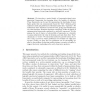Free Online Productivity Tools
i2Speak
i2Symbol
i2OCR
iTex2Img
iWeb2Print
iWeb2Shot
i2Type
iPdf2Split
iPdf2Merge
i2Bopomofo
i2Arabic
i2Style
i2Image
i2PDF
iLatex2Rtf
Sci2ools
117
click to vote
ARGMAS
2009
Springer
2009
Springer
Dominant Decisions by Argumentation Agents
Abstract. We introduce a special family of (assumption-based argumentation) frameworks for reasoning about the bene
ts of decisions. These frameworks can be used for representing the knowledge of intelligent agents that can autonomously choose the \best" decisions, given subjective needs and preferences of decision-makers they \represent". We understand \best" decisions as dominant ones, giving more bene
ts than any other decisions. Dominant decisions correspond, within the family of argumentation frameworks considered, to admissible arguments. We also propose the use of degrees of admissibility of arguments as a heuristic to assess subjectively the value of decisions and rank them from \best" (dominant) to \worst". We extend this method to provide notion of relative value of decisions where preferences over bene
ts are taken into account. Finally, we show how our techniques can be successfully applied to the problem of selecting satellite images to monitor oil...
ARGMAS 2009 | Artificial Intelligence | Assumption-based Argumentation | Bene Ts | Dominant Decisions |
Related Content
| Added | 26 May 2010 |
| Updated | 26 May 2010 |
| Type | Conference |
| Year | 2009 |
| Where | ARGMAS |
| Authors | Paul-Amaury Matt, Francesca Toni, Juan R. Vaccari |
Comments (0)

